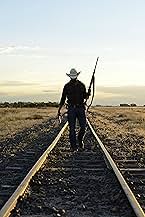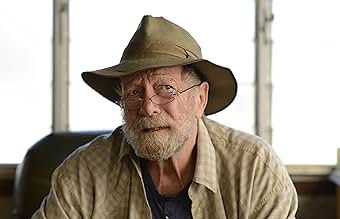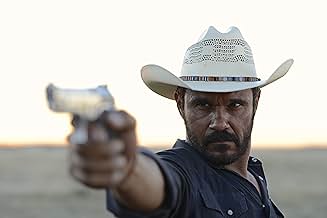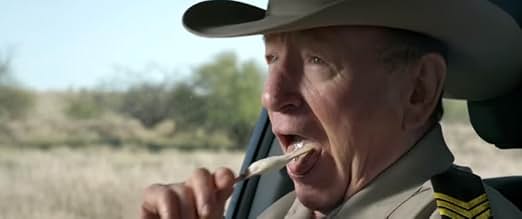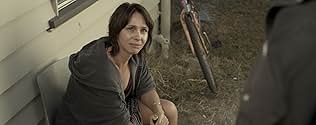An indigenous detective returns to the Outback to investigate the murder of a young girl.An indigenous detective returns to the Outback to investigate the murder of a young girl.An indigenous detective returns to the Outback to investigate the murder of a young girl.
- Awards
- 9 wins & 16 nominations total
- Director
- Writer
- All cast & crew
- Production, box office & more at IMDbPro
Featured reviews
The first scene sets up the whole film most deftly: its depiction of the magnitude of the land at sunset coupled with the place name, Massacre Creek, instantly makes it clear that the vastness of the Australian terrain and inglorious, largely unrepented historic events will frame what follows.
Aaron Pedersen plays the police detective Jay Swan, an Aboriginal returning from 'the city' to his small and extremely isolated home town after a 10 year absence. He is estranged from his former wife, now an alcoholic making a hash of raising their daughter, and also the community in which he was raised. Not fully accepted by the white community either, he is the classic outsider forced to go it alone.
Swan is assigned to the case of a murdered Aboriginal teenage girl whose body is found in a state of some decay quite some time after her violent end. It probably won't come as a great shock to find that the rest of the local constabulary, all white and male, are not only indifferent to the crime but hostile to its investigation, impeding Swan at every juncture. As Swan battles on uncovering corruption, drug dealing and civic sanctioned child prostitution, he starts to shed light on the town's inherent racism and misogyny – there appears to be no one in the town of any authority who is either black or female.
The film is a modern twist on the western genre: the lone lawman coming to town quietly determined to see right is done. It is the sort of role Gary Cooper, John Wayne and Jimmy Stewart all handled with ease 60 years ago. Aaron Pedersen is a worthy successor to these Hollywood greats, compelling in his restrained performance, giving just a hint of the angst beneath his calm exterior but always in control of himself. In the main, the supporting cast is also strong – especially Hugo Weaving as a police officer of dubious integrity and an alluded to murky past.
Like all classic westerns the film's denouement is a good old-fashioned shoot-out. This extended scene is particularly well handled by Sen with tight direction and camera work – although his cinematography throughout the film is praiseworthy.
The film has a few flaws. Early scene dialogue giving the backstory is rather stilted – though this quickly settled down; the minor character of a buffoonish local newspaper reporter was both unconvincing and irrelevant – it was as if Sen felt, wrongly, that his film needed a little comic relief. And I was surprised at the amount of drugs uncovered in such a very small town. I'm no expert but I'd have thought the quantity shown would be enough to supply the whole of Melbourne – including its nearby rock festivals – for a year.
Ultimately, many of the film's plot strands were left hanging which was, ostensibly, rather untidy. But on this, I'm giving Ivan Sen the benefit of the doubt. There was no neat resolution to his film or the crimes it depicts, because there is, as yet, no resolution to the social issues he raised in a non-preachy manner.
The movie narrates a story of a lonely detective who tries to hunt down the murderer of a young girl in the remote and sparsely inhabited territory of Australia. But the movie is intended to be real, and makes a great effort in order to achieve that. It tries to show us the everyday life of a lonesome ranger in a realistic way. Thus, it could give us a totally different picture than the Hollywood action-stuffed blockbusters can provide.
We can hardly see a single gun in use throughout the whole movie, but somehow it manages to attract the attention of the audience. The newer and newer details of the crime are revealed in a nicely right pace. Sometimes, during the interrogation of a person I've already known what the detective's following question would be. But not the teeming clichés are responsible for that (because there were any), but the adequate atmosphere what the movie could have created, because it's able to involve the audience and encourage them to investigate along with the protagonist.
At the beginning I felt the fact a bit weird, that almost every single member of the town were totally unfriendly with the detective, even a few years old tiny kid, who was brave enough to announce without batting an eyelid that he'd take the detective's life. But later I realized, that I wouldn't be really happy too, if a ranger wanted to ask me a few question about a murder. However, not only these people were raw to the protagonist, but the other policeman were pretty arrogant either. We can feel the tension in almost every moment of an interrogation, because the conversations are usually interrupted with awkward silence, because the detective could hardly pull out the valuable information out of the people. That's why the dialgoues are occasionally a bit silly, but there are some moments when they're quite funky and gripping.
Nevertheless, the actors did a fine job, as far as some of them had only little opportunity to prevail on the silver screen. I admit, that it wasn't Hugo Weaving's most outstanding performance, as we could see him acting far better in the Matrix or in The Lord of the Rings. But I couldn't blame him for that, because his character was really obnoxious in this movie. I could have accused him at his first appearance on the screen, like almost any other people in the movie, except the protagonist.
We can hardly hear any music or soundtrack throughout the movie (only one or two), but it simply draws benefits from that, because the movie could create a much more depressing atmosphere int hat way. The film could perfectly visualize in front of our eyes, that the detectives don't have as fast-paced life as we could experience that in the high- budget Hollywood movie, but they are much slower, tedious, tiresome and difficult. The film owns a nearly 2 hours long runtime, thanks to the fact in part, that it has taken up the conventional towed style of the western genre. There are some moment, when we could see the characters looking at each for a quite long time period without moving or saying a word. But it had to be like this! So no worries!
If You'd like to experience a life-like investigation in a realistically implemented environment in the company of a logically built up storyline, than I can bravely recommend You this movie! Buti f You wanna see some action scenes speeding by right after other, and You don't wanna get slowed down, then this movie will not be your cup of tea.
Thanks for spending your precious free time with reading my review! Hope you liked it!
Did you know
- TriviaMuch of this film is shot in the small Australian town of Winton. Mystery Road held its first screening there. Some of iconic Australian film, Crocodile Dundee, was shot there (The Walkabout Creek Pub Scene).
- GoofsWhen the detective pulls up to Mary's house, she is watering the lawn with a hose. But when Mary calls Crystal to come out, she no longer has the hose and it isn't on the ground when the scene widens. When Crystal walks over to the detective's car, Mary once again has hose in hand, watering.
- Quotes
[first lines]
Detective Jay Swan: [waking to answer the phone] Yeah? Alright. OK...
[rolls out of bed]
Robbo: [greeting his arrival on scene] Jay...
Detective Jay Swan: G'day, Robbo. What's the story?
Robbo: The truckie pulled up to check his trailers, heard a wild dog growling from under the bridge, smelt something rotten.
Detective Jay Swan: How did he know it was a wild dog?
Robbo: Guess he just knows the difference, I suppose. You know, between a wild dog and a wild kind of normal dog.
- How long is Mystery Road?Powered by Alexa
Details
Box office
- Budget
- A$3,000,000 (estimated)
- Gross worldwide
- $280,702
Contribute to this page





